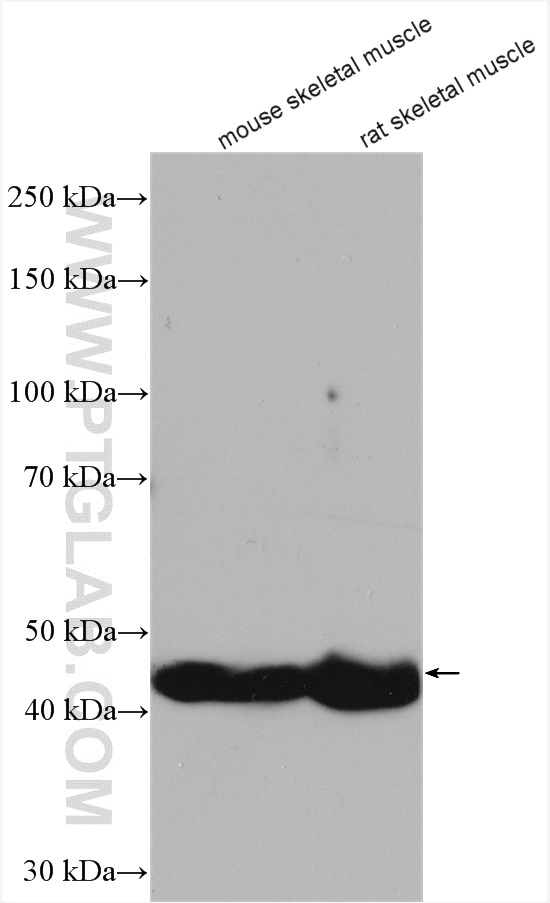验证数据展示
经过测试的应用
| Positive WB detected in | mouse skeletal muscle tissue, rat skeletal muscle tissue |
推荐稀释比
| 应用 | 推荐稀释比 |
|---|---|
| Western Blot (WB) | WB : 1:500-1:1000 |
| It is recommended that this reagent should be titrated in each testing system to obtain optimal results. | |
| Sample-dependent, Check data in validation data gallery. | |
产品信息
25584-1-AP targets LRRC52 in WB, ELISA applications and shows reactivity with human, mouse, rat samples.
| 经测试应用 | WB, ELISA Application Description |
| 经测试反应性 | human, mouse, rat |
| 免疫原 | LRRC52 fusion protein Ag22354 种属同源性预测 |
| 宿主/亚型 | Rabbit / IgG |
| 抗体类别 | Polyclonal |
| 产品类型 | Antibody |
| 全称 | leucine rich repeat containing 52 |
| 别名 | LRRC52 |
| 计算分子量 | 313 aa, 35 kDa |
| 观测分子量 | 45 kDa |
| GenBank蛋白编号 | BC132981 |
| 基因名称 | LRRC52 |
| Gene ID (NCBI) | 440699 |
| RRID | AB_2880140 |
| 偶联类型 | Unconjugated |
| 形式 | Liquid |
| 纯化方式 | Antigen affinity purification |
| UNIPROT ID | Q8N7C0 |
| 储存缓冲液 | PBS with 0.02% sodium azide and 50% glycerol , pH 7.3 |
| 储存条件 | Store at -20°C. Stable for one year after shipment. Aliquoting is unnecessary for -20oC storage. |
背景介绍
LRRC52 (leucine-rich repeat-containing protein 52) belongs to the gamma family of the BK channel accessory subunits, which potentially regulate the channel's gating properties (PMID: 22547800). It is dominantly expressed in testis and skeletal muscle, with much lower expression in several other tissues including placenta, kidney, lung, and some glands. LRRC52 has been reported as a Slo3 auxiliary subunit that helps define the specific alkalization dependence of KSper activation. LRRC52 has a calcular molecular weight of 35 kDa. This polyclonal antibody raised against 24-244aa of human LRRC52 reveals a band of 45 kDa, which is consistent with the molecular weight of glycosylated form of LRRC52 (PMID: 22084117).
实验方案
| Product Specific Protocols | |
|---|---|
| WB protocol for LRRC52 antibody 25584-1-AP | Download protocol |
| Standard Protocols | |
|---|---|
| Click here to view our Standard Protocols |
